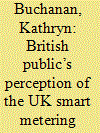| Srl | Item |
| 1 |
ID:
150863


|
|
|
|
|
| Summary/Abstract |
Consumer acceptance of smart meters remains crucial in achieving the potential carbon emission reductions offered by advanced metering infrastructures. Given this, the present research used deliberative focus groups to examine what is needed to secure acceptance and engagement from domestic consumers with services, products and ‘offers’ in smarter power systems. Our findings suggest that consumers are able to identify not just threats relating to smart metering initiatives but opportunities as well. In particular, our focus group participants responded positively to the idea of an automated system that could be used to achieve energy savings in combination with time-of-use tariffs. We conclude by outlining suggestions for policy recommendations that may help consumer acceptance of smart meter enabled services be more readily achieved.
|
|
|
|
|
|
|
|
|
|
|
|
|
|
|
|
| 2 |
ID:
125411


|
|
|
|
|
| Publication |
2013.
|
| Summary/Abstract |
Dynamic pricing is being discussed as one method of demand side management (DSM) which could be crucial for integrating more renewable energy sources into the electricity system. At the same time, there have been very few analyses of consumer preferences in this regard: Which type of pricing program are consumers most likely to choose and why? This paper sheds some light on these issues based on two empirical studies from Germany: (1) A questionnaire study including a conjoint analysis-design and (2) A field experiment with test-residents of a smart home laboratory. The results show that consumers are open to dynamic pricing, but prefer simple programs to complex and highly dynamic ones; smart home technologies including demand automation are seen as a prerequisite for DSM. The study provides some indications that consumers might be more willing to accept more dynamic pricing programs if they have the chance to experience in practice how these can be managed in everyday life. At the same time, the individual and societal advantages of such programs are not obvious to consumers. For this reason, any market roll-out will need to be accompanied by convincing communication and information campaigns to ensure that these advantages are perceived.
|
|
|
|
|
|
|
|
|
|
|
|
|
|
|
|
| 3 |
ID:
176908


|
|
|
|
|
| Summary/Abstract |
To invest in solar energy, users must be convinced about the benefits this technology offers. Thus, we need a better understanding how these advantages can be communicated and how a message's effectiveness depends on individual characteristics. Relying on the regulatory focus theory (RFT), we suggest that the effectiveness of a message is contingent on users' personal regulatory focus. According to RFT, two systems guide information processing: a promotion focus (being eager to attain gains) and a prevention focus (being vigilant to avoid losses). Utilizing data from 369 people surveyed in four mid-sized cities in Germany, we measured their chronic focus and exposed them to one of four conditions: promotion framing, prevention framing, both framings combined, or no framing. An ANOVA revealed no framing differences between groups regarding perceived benefits of solar energy. However, a moderated regression analysis showed that promoters perceived more advantages if the message highlighted the gains achieved by using solar energy, whereas preventers were more convinced if the message highlighted how solar energy helps to avoid losses. As perceived benefits were related to actual investment, we suggest that advantages associated with solar energy should be conveyed in a manner that fits users' regulatory focus.
|
|
|
|
|
|
|
|
|
|
|
|
|
|
|
|